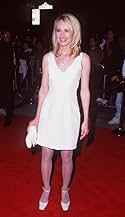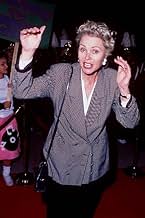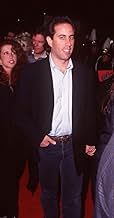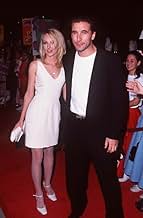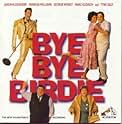IMDb-BEWERTUNG
5,8/10
1009
IHRE BEWERTUNG
Füge eine Handlung in deiner Sprache hinzuRock-and-roll icon Conrad Birdie is about to go into the Army, and plans are being made to arrange his final going-away concert.Rock-and-roll icon Conrad Birdie is about to go into the Army, and plans are being made to arrange his final going-away concert.Rock-and-roll icon Conrad Birdie is about to go into the Army, and plans are being made to arrange his final going-away concert.
- 1 Primetime Emmy gewonnen
- 1 Gewinn & 3 Nominierungen insgesamt
Shelley Stewart Hunt
- Alice
- (as Shelley S. Hunt)
Marlowe Windsor
- Suzie
- (as Marlowe Windsor-Menard)
Empfohlene Bewertungen
Poor BYE BYE BIRDIE! It can't get any respect.
A terrific unexpected hit on Broadway in 1960 (608p. April 14 - Oct. 7, 1961, at the Martin Beck, 54th Street & Shubert Theatres and reproduced by virtually every high school drama department in the country!), it was travestied as a 1963 film that threw out half the plot and tossed in a TOTALLY inappropriately old and slutty (except for libidinous teenagers and dirty old men) Ann Margaret as a supposed "teenager." At least IT had the good sense to retain most of the best of the Broadway Cast (except for the luminous Chita Rivera as "Rosie").
Now in 1995, falsely advertising itself as a "faithful" filming of the show, we are given for our sins a "cast by 'Q Ratings'" travesty (the supposedly innocent ...BIRDIE is set before "Loving vs. Virginia" and an interracial couple, Albert & Rosie, in Sweetwater, Ohio would have been more controversial than Conrad Birdie's supposedly worldly "bad influence") with three exceedingly dull songs replacing better ones and Michael Stewart's finely tuned book diluted by someone who seems to have thought the Rock Hudson/Doris Day movies were too challenging.
There are bright spots rising above the amateur re-writing and direction (can this possibly be the same Gene Sacks who gave us the original MAME on stage? Hollywood certainly didn't agree with him!): Marc Kudisch is a legitimately wonderful "Birdie," and the always superbly grounded Tyne Daly almost pulls off an appropriately cartoonish Mae (Albert's mother). Everyone else however is cast with as little concern for the characters they are playing as Ann Margaret was in the first movie version, but without the lecherous overlay, and consequently sink to new professional lows. Jason Alexander is a decent comic actor - always the "go-to guy" if you couldn't afford Nathan Lane (rather like Sally Ann Howes was to Julie Andrews), but if you remember Albert as a charismatic, lanky dancer like Dick Van Dyke, give this sad remake a very wide berth.
A terrific unexpected hit on Broadway in 1960 (608p. April 14 - Oct. 7, 1961, at the Martin Beck, 54th Street & Shubert Theatres and reproduced by virtually every high school drama department in the country!), it was travestied as a 1963 film that threw out half the plot and tossed in a TOTALLY inappropriately old and slutty (except for libidinous teenagers and dirty old men) Ann Margaret as a supposed "teenager." At least IT had the good sense to retain most of the best of the Broadway Cast (except for the luminous Chita Rivera as "Rosie").
Now in 1995, falsely advertising itself as a "faithful" filming of the show, we are given for our sins a "cast by 'Q Ratings'" travesty (the supposedly innocent ...BIRDIE is set before "Loving vs. Virginia" and an interracial couple, Albert & Rosie, in Sweetwater, Ohio would have been more controversial than Conrad Birdie's supposedly worldly "bad influence") with three exceedingly dull songs replacing better ones and Michael Stewart's finely tuned book diluted by someone who seems to have thought the Rock Hudson/Doris Day movies were too challenging.
There are bright spots rising above the amateur re-writing and direction (can this possibly be the same Gene Sacks who gave us the original MAME on stage? Hollywood certainly didn't agree with him!): Marc Kudisch is a legitimately wonderful "Birdie," and the always superbly grounded Tyne Daly almost pulls off an appropriately cartoonish Mae (Albert's mother). Everyone else however is cast with as little concern for the characters they are playing as Ann Margaret was in the first movie version, but without the lecherous overlay, and consequently sink to new professional lows. Jason Alexander is a decent comic actor - always the "go-to guy" if you couldn't afford Nathan Lane (rather like Sally Ann Howes was to Julie Andrews), but if you remember Albert as a charismatic, lanky dancer like Dick Van Dyke, give this sad remake a very wide berth.
I think it's mostly due to some of the most...questionable casting I have ever seen that makes this movie not work. I mean, they make this big to-do about Rosie being Spanish in this one. I think that's because Chia Rivera had the role in the play, but Chia Rivera is (assumingly) Spanish. Why wasn't a Spanish lady cast in this one instead of Vanessa Williams? It's down-right ridiculous and they keep emphasising that she's Spanish to make it even worse. At least in the 1963 one, when Janet Leigh played Rosie they were smart enough to change the last name and not try to pass her off as something she wasn't.
The casting of Chynna Phillips as Kim was every bit as...well, wrong. She was obviously pushing 30 and quite looked it to, as did every other "teen" in this film. As for Jason Alexander as a romantic lead? Uh..no comment. Plus, I hate when Albert wants to become an English teacher instead of a scientist. I'm aware that it is in the play and such, but it's boring, especially that song that keeps getting reprised where Rosie sings about him wanting to be one. And Alexander is just not right for that part. But nobody really is in this film, sorry to say. Even the usually good Tyne Daly cannot is quite grating and hammy as Albert's mother, and some part where she emerges from a bay of water to give somebody advice and then swims away was horrificly ridiculous.
And what about the climactic ending? I'm not sure about the play, but the 1963 film was able to get to its big climactic scene of Conrad Birdie finally being able to perform at the Ed Sullivan show, after they got rid of the Russians who almost pre-empted him. The people behind this film said in an interview that they got rid of all of the Cold War humor, but why? Maybe the Cold War had ended in 1995, but this is a film set in the 60s when it was still going strong. Did they think Russians watching would be offended? They understand history and can comprehend that those aren't our feelings toward them now. I hate when films try to be all PC like that. It just makes them look bad.
But being PC wasn't the only thing that made this look bad. It was gone way before the ending.
The casting of Chynna Phillips as Kim was every bit as...well, wrong. She was obviously pushing 30 and quite looked it to, as did every other "teen" in this film. As for Jason Alexander as a romantic lead? Uh..no comment. Plus, I hate when Albert wants to become an English teacher instead of a scientist. I'm aware that it is in the play and such, but it's boring, especially that song that keeps getting reprised where Rosie sings about him wanting to be one. And Alexander is just not right for that part. But nobody really is in this film, sorry to say. Even the usually good Tyne Daly cannot is quite grating and hammy as Albert's mother, and some part where she emerges from a bay of water to give somebody advice and then swims away was horrificly ridiculous.
And what about the climactic ending? I'm not sure about the play, but the 1963 film was able to get to its big climactic scene of Conrad Birdie finally being able to perform at the Ed Sullivan show, after they got rid of the Russians who almost pre-empted him. The people behind this film said in an interview that they got rid of all of the Cold War humor, but why? Maybe the Cold War had ended in 1995, but this is a film set in the 60s when it was still going strong. Did they think Russians watching would be offended? They understand history and can comprehend that those aren't our feelings toward them now. I hate when films try to be all PC like that. It just makes them look bad.
But being PC wasn't the only thing that made this look bad. It was gone way before the ending.
The 1963 film was not perfect, with a couple of dated references, two casting choices that seemed off and the story sometimes did suffer in a messy kind of way from the tinkering made. It was however colourful, energetic, witty and when the cast worked they were just wonderful. In short, I don't love it but there is much to like about it and gets a bad rep from those who have the mindset that anything that makes changes from the source material is immediately to be put down upon.
People will love that this film from 1995 is closer to the stage version, especially in the dialogue and story. However, those who loved the energy, colour and wit that the 1963 film had might find themselves short-changed. I fall into that camp I'm afraid to say, and I also feel that being more faithful doesn't always mean it's better. It does have good things certainly, the songs are wonderful and I did like two performances.
Vanessa Williams was the best asset, she is not just charming but is much more of a spitfire than Janet Leigh was, and her singing is heavenly especially in What Did I Ever See in Him, also the best individual rendition. Tyne Daly is also deliciously overbearing and immensely fun to watch, she and Maureen Stapleton are about equal here. However, I didn't care for the rest of the cast. Jason Alexander does give his all and he can sing, but he also tries too hard and has little of the effortless sham charm that Dick Van Dyke brought to Albert.
Whereas the performance of Harry from Paul Lynde was one of the 1963 film's high points, it was one of the things in this version that was less good. George Wendt lumbers his way through it and has very little comic timing, when he does show it it doesn't feel very natural. Marc Kudisch is a slight improvement over Jesse Pearsson, but neither of the Conrads worked in either version. Pearsson's performance suffered from that he did very little with a character that was underdeveloped in the film already, Kudisch has the better looks and voice but also came across as annoying to me from playing Conrad too broadly. Jason Gaffney is just as bland as Bobby Rydell, so like I said with Daly and Stapleton being equally good I'd deem Gaffney and Rydell just as bad(Rydell gets a marginal point for being more believable as a dork).
Chynna Phillips was the worst though. She doesn't believe at all as a teenager, at least 10 years too old, and makes little if any attempt to act like one. She also struggles with the high notes, continually sounding strained, and is even worse as an actress. Ann Margaret(much of which the 1963 film revolved around) had charm, likability and command, Phillips just never seems sure what to do with herself.
The film doesn't look amateurish or anything, the scenery and costumes are very nicely done and it is competently filmed at least. The lighting is rather drab though and there was always a TV movie feel to it that was never quite shaken off. The dialogue that was delivered with such elegance and wit in the earlier version here despite being closer to that of the stage version didn't have anywhere near the same impact and sounded like the actors were reading rather than living the lines. The satire was also nowhere near as sharp or witty either. The story is more succinct, but I didn't feel as much of the farcical comedy of errors quality that the 1963 film did(even with the tinkerings) or the charm, colour or energy. The choreography was surprisingly dull, there is an effort at pizazz but done in a clichéd way and even in a way that sucks the film of vitality or warmth.
Overall, more faithful but also inferior, Williams, Daly and the songs are great but everything else falls flat. 3/10 Bethany Cox
People will love that this film from 1995 is closer to the stage version, especially in the dialogue and story. However, those who loved the energy, colour and wit that the 1963 film had might find themselves short-changed. I fall into that camp I'm afraid to say, and I also feel that being more faithful doesn't always mean it's better. It does have good things certainly, the songs are wonderful and I did like two performances.
Vanessa Williams was the best asset, she is not just charming but is much more of a spitfire than Janet Leigh was, and her singing is heavenly especially in What Did I Ever See in Him, also the best individual rendition. Tyne Daly is also deliciously overbearing and immensely fun to watch, she and Maureen Stapleton are about equal here. However, I didn't care for the rest of the cast. Jason Alexander does give his all and he can sing, but he also tries too hard and has little of the effortless sham charm that Dick Van Dyke brought to Albert.
Whereas the performance of Harry from Paul Lynde was one of the 1963 film's high points, it was one of the things in this version that was less good. George Wendt lumbers his way through it and has very little comic timing, when he does show it it doesn't feel very natural. Marc Kudisch is a slight improvement over Jesse Pearsson, but neither of the Conrads worked in either version. Pearsson's performance suffered from that he did very little with a character that was underdeveloped in the film already, Kudisch has the better looks and voice but also came across as annoying to me from playing Conrad too broadly. Jason Gaffney is just as bland as Bobby Rydell, so like I said with Daly and Stapleton being equally good I'd deem Gaffney and Rydell just as bad(Rydell gets a marginal point for being more believable as a dork).
Chynna Phillips was the worst though. She doesn't believe at all as a teenager, at least 10 years too old, and makes little if any attempt to act like one. She also struggles with the high notes, continually sounding strained, and is even worse as an actress. Ann Margaret(much of which the 1963 film revolved around) had charm, likability and command, Phillips just never seems sure what to do with herself.
The film doesn't look amateurish or anything, the scenery and costumes are very nicely done and it is competently filmed at least. The lighting is rather drab though and there was always a TV movie feel to it that was never quite shaken off. The dialogue that was delivered with such elegance and wit in the earlier version here despite being closer to that of the stage version didn't have anywhere near the same impact and sounded like the actors were reading rather than living the lines. The satire was also nowhere near as sharp or witty either. The story is more succinct, but I didn't feel as much of the farcical comedy of errors quality that the 1963 film did(even with the tinkerings) or the charm, colour or energy. The choreography was surprisingly dull, there is an effort at pizazz but done in a clichéd way and even in a way that sucks the film of vitality or warmth.
Overall, more faithful but also inferior, Williams, Daly and the songs are great but everything else falls flat. 3/10 Bethany Cox
I was extremely impressed when I sat down to watch this movie in December 2002. It is a lot like the Broadway musical, and even better! And I loved the new songs - Let's Settle Down, A Giant Step, and A Mother Doesn't Matter Anymore. Tyne Daly was extremely funny in her role as Mamma, I think this is the best thing she has ever done. Keep going!
Although I always loved the 1963 film version of Bye Bye Birdie I never realized how different it was from the Broadway production until I saw this remake on TV. This was an absolute joy to watch from beginning to end and more tuned to older audiences than the 1963 version which was aimed primarily at the younger set.
Wusstest du schon
- WissenswertesIn an Archive of American Television interview, Jason Alexander said that the day after the movie aired, he received a bouquet of flowers and a note that read "Dear Jason. Now I know how to play the role. You were terrific. Love Dick Van Dyke."
- PatzerAlbert, Rose and Conrad are shown departing from New York's Pennsylvania Station, in the film a terminal with "head-end" outdoor platforms at the same level as the station lobby. In reality, trains ran through Penn Station with platforms on the lower level.
- VerbindungenFeatured in Stealing Focus: ABC Musical Madness - Bye Bye Birdie '1995' (2019)
Top-Auswahl
Melde dich zum Bewerten an und greife auf die Watchlist für personalisierte Empfehlungen zu.
Details
Zu dieser Seite beitragen
Bearbeitung vorschlagen oder fehlenden Inhalt hinzufügen

